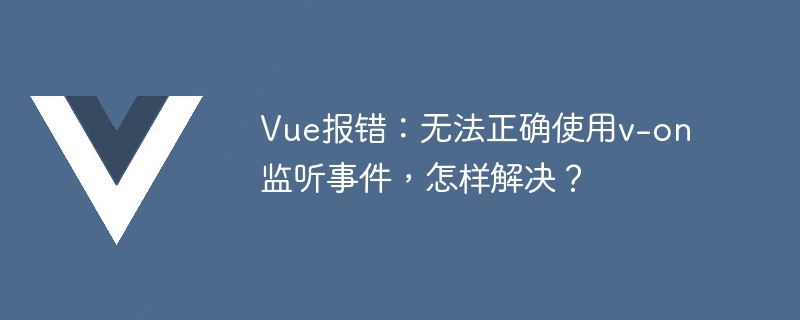Home >Web Front-end >Vue.js >Vue error: Unable to use v-on to listen for events correctly, how to solve it?
Vue error: Unable to use v-on to listen for events correctly, how to solve it?
- WBOYWBOYWBOYWBOYWBOYWBOYWBOYWBOYWBOYWBOYWBOYWBOYWBOriginal
- 2023-08-26 14:29:121636browse

Vue error: Unable to use v-on to listen for events correctly, how to solve it?
In Vue development, we often use the v-on directive to listen to DOM events and execute the corresponding methods. But sometimes, we may encounter the problem of not being able to correctly use v-on to listen for events, resulting in the event not being triggered or an error being reported.
This article will introduce some common causes of errors and give solutions to help everyone solve such problems.
- Event method naming error
When the event method we bind in the v-on directive is named incorrectly, the event will not be triggered. This is a common mistake, especially when the amount of code is large or when the team is working together to develop.
Solution: First check whether the event method is named correctly and ensure that the method name corresponds to the bound event. You can also use devtools and other tools within the component to debug and locate specific errors.
For example, if we have a button button and want to trigger a method when clicked, we can write like this:
<template>
<button v-on:click="handleClick">点击按钮</button>
</template>
<script>
export default {
methods: {
handleClick() {
// 事件处理逻辑
}
}
}
</script>- Use arrow functions
In Vue, if we use arrow functions to define event handlers, the event will not be triggered normally. This is because this in the arrow function points to the context in which the arrow function is defined, not the Vue instance.
Solution: Avoid using arrow functions to define event handlers. Instead, use ordinary functions or bind this to ensure that this points to the Vue instance.
For example, the following code will cause the event to fail to trigger normally:
<template>
<button v-on:click="() => handleClick()">点击按钮</button>
</template>
<script>
export default {
methods: {
handleClick() {
// 事件处理逻辑
}
}
}
</script>You should change the arrow function to the form of a normal function:
<template>
<button v-on:click="handleClick">点击按钮</button>
</template>
<script>
export default {
methods: {
handleClick() {
// 事件处理逻辑
}
}
}
</script>- This points to the problem
In Vue's event handling function, this points to the Vue instance by default. However, in some special cases, such as when using asynchronous functions such as async/await, an error may occur in the this pointer, causing the event to not be triggered correctly.
Solution: Store this in another variable to ensure it can be used correctly in the event handling function.
For example, the following code will cause this to point to the wrong problem:
<template>
<button v-on:click="handleClick">点击按钮</button>
</template>
<script>
export default {
methods: {
async handleClick() {
this.data = await fetchData(); // 此处this指向错误
}
}
}
</script>You should store this in another variable and then use the variable in the asynchronous function to ensure the correct use of this:
<template>
<button v-on:click="handleClick">点击按钮</button>
</template>
<script>
export default {
methods: {
async handleClick() {
const vm = this;
vm.data = await fetchData(); // 此处使用vm确保正确的this指向
}
}
}
</script>Summary:
The above are some common reasons why v-on monitoring events cannot be used correctly and the corresponding solutions. I hope this article can help you solve similar problems encountered in Vue development. When an event cannot be triggered or an error is reported, you can check whether the event method is named correctly, avoid using arrow functions, and pay attention to the problem pointed by this. Through these methods, we can better handle event listening issues and improve development efficiency and user experience.
The above is the detailed content of Vue error: Unable to use v-on to listen for events correctly, how to solve it?. For more information, please follow other related articles on the PHP Chinese website!

